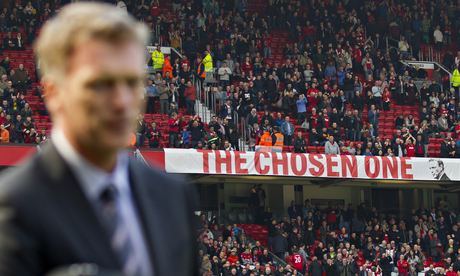David Moyes needs to shrug off his old Everton ways at Manchester United
Though they have the best away form in the Premier League, United don't perform at home because of the manager's mindset
The world that David Moyes has entered at Manchester United is one of a club accustomed to winning. Photograph: Jon Super/AP
When I joined Liverpool in 1992, the first game of the season was a Charity Shield match at Wembley. We lost 4-3 to Leeds and, as we all piled back on the team bus, I'll never forget the bus driver – "Helmet", we called him – saying to me: "Don't worry, lad, we go to Wembley at least once a season here."
That was my introduction to Liverpool. The club that expects to go to Wembley. The club that expects success. As we now know, that was also the beginning of the end of Liverpool's dominant period, and later that season, Helmet took me aside once more to say, incredulously: "I can't believe we're not going to Wembley," as though it should have been a given.
Such is the world that
David Moyes has entered at
Manchester United. A club so accustomed to winning that its fans are beginning to talk of protests, and hiring aeroplanes to fly messages across the sky.
Meanwhile, fans, pundits, onlookers and commentators have all struggled to pinpoint exactly what is going wrong at United. We've heard a myriad of opinions – ageing players, players not pulling their weight, players being played out of position, too much influence from Fergie, not enough influence from Fergie – but I can't help wondering if there actually is anything fundamentally wrong with the team itself.
Just take a look at their away form: until Saturday's matches, United were top of the table. It seems unbelievable, I know. Then have a look at their home form and United are languishing in the bottom half. Not performing at Old Trafford? The fortress, the legendary stadium to which other teams turn up and know they are beaten before they've even left the changing rooms? It's unthinkable. And it's understandably frustrating for the 60,000-odd United season ticket holders who are unused to such a phenomenon.
So why can't United perform at home? For me the reasons are 100% psychological. At Everton, even during a good run, Moyes was never expected to win all his home games. He has simply never experienced this level of pressure before, and in front of so many expectant home fans. He no doubt carries a residual historic nervousness around Old Trafford, because for opposition managers, Old Trafford has always been an intimidating, awe-inspiring stadium, and every sign of insecurity, every glimpse of a lack of confidence, every hesitation from Moyes in his preparation for a home game then resonates throughout that changing room.
Away games are different. Whether it's Everton at the Emirates, or Manchester United at the Emirates, it's all still away. You set up differently, your team talk is different, your expectations are different. It's a familiar formula for Moyes, comfortable and well-honed over the years.
There lies the crux of it. Essentially, Moyes is still Moyes the Everton manager. He still thinks, talks and acts like an Everton manager. He is awkward and unfamiliar in his dealings with United's superstar stable of players who struggle to respect him. He is too hands on – getting too involved in training instead of leaving it to his coaches, as Sir Alex Ferguson used to. Players like to moan and vent at their coaches on the training pitches so they can feel confident that it won't affect them come Saturday's match. If the manager is always taking training, there is nowhere to release those frustrations and players soon begin to retreat and grow resentful.
When Moyes answers questions from the media, he speaks like he is still at Everton. "We've been training well and I know we're going to turn it round." That's an Everton manager answer. It's the answer you give for Everton because you're not expected to win week in, week out. Always, the emotion is written all over his face. With Ferguson, if he wasn't happy it was always someone else's fault – the ballboy, the referee – he deflected everything. Similarly, José Mourinho at Chelsea tends to avoid answering the question and instead comes up with some subterfuge to talk about.
What Ferguson was so good at was being the biggest person in the equation. The best at mind games, the most in control. The centre of the universe. That gives your players confidence that you can deal with anything, you run the ship regardless. You are top dog. You have the last word. You are chief psychopath in the bizarre world of football psychopaths.
Under Ferguson we rarely knew what was really going on at United. I've talked about it before, the Man Utd mafia, the omertà, a grip of such strength that still to this day – despite intense media coverage and speculation – no one, apart from those who were there, really knows what happened when David Beckham got a boot in his eye. That hold over the dressing room is fading now. There are leaks, suggestions and stories coming out of United in a way not seen before. Moyes isn't a bad person, or a bad manager, he's just being himself. But that's not the United mantra.
Ultimately, United are going through an evolutionary period. As Darwin says, the most dominant force always gets overtaken at some point. Whether that was Liverpool in the 1990s, or now United. Fans at Old Trafford will have to get used to booing, for now, because evolution takes time.
http://www.theguardian.com/football/blog/2014/mar/29/david-moyes-everton-ways-manchester-united




